Multimedia Content
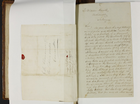
Copy of Warrant served to William Barrett, 17 August 1843, courtesy of Public Record Office Victoria, Victorian Archives Centre.
Details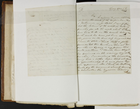
Letter from M Fairfax to Council, 8 April 1843, courtesy of Public Record Office Victoria, Victorian Archives Centre.
Details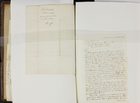
Letter to chairman of assessment committee , 5 October 1843, courtesy of Public Record Office Victoria, Victorian Archives Centre.
Details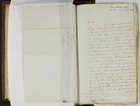
Letter to Chairman of Council from Town Clerk, 15 September 1843, courtesy of Public Record Office Victoria, Victorian Archives Centre.
Details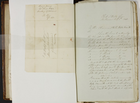
Letter to Chairman of Public Works Committee from Charles La Trobe, 8 July 1843, courtesy of Public Record Office Victoria, Victorian Archives Centre.
Details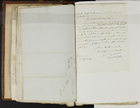
Letter to council from George Cole, 25 April 1843, courtesy of Public Record Office Victoria, Victorian Archives Centre.
Details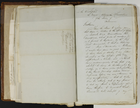
Letter to Council from James Cain, 23 April 1843, courtesy of Public Record Office Victoria, Victorian Archives Centre.
Details
Letter to council from John Dickson, 14 February 1843, courtesy of Public Record Office Victoria, Victorian Archives Centre.
Details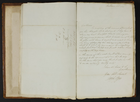
Letter to council from Joseph Byrne, 8 February 1843, courtesy of Public Record Office Victoria, Victorian Archives Centre.
Details
Letter to council from M Howe, 28 February 1843, courtesy of Public Record Office Victoria, Victorian Archives Centre.
Details
Melbourne City Council
The Melbourne City Council (MCC) is the City's oldest and best-known institution of municipal government, representing and serving Central Melbourne for more than 150 years. Boundaries, the franchise and number of councillors have changed since 1842 when the MCC was Melbourne's first representative institution of note. The creation of new suburban municipalities from 1855 meant it could no longer represent the whole metropolitan area but it became the largest, wealthiest and most powerful of Melbourne's many municipalities, with an extensive bureaucracy. In recent decades its influence has declined with increased suburbanisation and restructuring. The MCC has been involved in politics and has had an uneasy relationship with the central government. Administrations of different political allegiance have intervened in its affairs to benefit one group of constituents or another, or to remove powers. Its role is now as much ceremonial, symbolic, promotional and supervisory as practically administrative.
Melbourne, like Sydney, gained its town council in 1842. For electoral purposes the town was divided into four wards on the intersection of Bourke and Elizabeth streets: Bourke to the north-west and, proceeding clockwise, Gipps, La Trobe and Lonsdale wards. Each returned three councillors who retired annually in rotation in three-year cycles. Ward councillors chose an alderman, who was more senior than councillors, had a seven-year term, and presided over the voting rolls. The franchise was based on property. Voting rights were attained by 'burgesses', aged 21 or more, male occupiers of rateable property having an annual value as rent of £25. A burgess, or his wife, who had property of £1000 or who occupied rateable property of £50, could stand for Council. Women ratepayers were not given the vote until 1896, and were not entitled to stand for Council until 1938.
The Council's act of constitution drew on innovative English legislation. It outlined responsibilities relating to justices, butchers, markets, roads, police and sewerage, and gave power to make by-laws and to regulate nuisances. But foundation and early Melbourne was a primitive place, with the economy in depression and funds short. The Council did little more than oversee the market, but nevertheless became a focus for politics. Electoral contests reflected community and individual aspirations, sectarianism and Freemasonry. The MCC was a vehicle for opposition to the transportation of convicts and support for Separation.
Melbourne was made a City by an Act of the New South Wales legislature in 1849, the term 'burgess' being replaced with 'citizen'. In 1851-54 the first Melbourne Town Hall was built on Swanston Street. In 1850 the area then known as Collingwood was constituted the MCC's Fitz Roy ward and later took that name. Subsequent wards were Hotham (1855), Macarthur (1856) and Smith (1856), centred on the areas of North Melbourne, Port Melbourne and Carlton respectively.
Following Separation many former City councillors entered the Parliament of Victoria. The gold rush placed additional demands on the MCC, which fell into disfavour, criticised for incapacity and for being dominated by Irish hotelkeepers grown rich on immigration. Although it lost power over water supply and sewerage, an inquiry found no proof of wrongdoing and helped the Council obtain necessary borrowing powers and the Gabrielli loan. It also recommended additional municipalities. Sandridge, Fitzroy, Hotham and Emerald Hill became municipalities, but Smith ward remained with the MCC. In 1851 only 31% of the city's population lived beyond the Council's boundaries but by 1861 the figure was 70%, a result of the combined effects of city growth and secession. Following an aggressively fought 'reform' campaign in 1861-63, the MCC became more representative of the City's business and professional elites. Amendments to its Act introduced secret ballots, a three-tiered property franchise and plural voting - less than £50 rateable property entitled the occupier to one vote, £50 to £150 two votes and more than £150 three votes. From 1870 new wards (Victoria and Albert) were based on North Carlton and residential land around the Royal Botanic Gardens respectively.
The town clerk from 1856 to 1891 was an Anglo-Irish gold generation immigrant and lawyer, Edmund FitzGibbon. Prominent in defence of municipal government, he believed in developing assets, extending services and reducing rates. Backed by the MCC, he opposed the government selling city parks for revenue and urged they be vested in the MCC, contrasting the conflict-ridden and often chaotic parliamentary politics with the smooth workings of the MCC's committee system. FitzGibbon was an early advocate of a metropolitan board of works to permit the municipalities to reclaim or develop common services, including water supply and sewerage, transport, gas and electricity supply and became first chairman of the Melbourne and Metropolitan Board of Works (MMBW) in 1891.
The MCC increased its wealth in the period 1850-90. In addition to increases in the value of rateable property, from 1863 the Council was permitted to lease assets and rights, and build and obtain revenue from the markets. A substantial new town hall, completed in 1870, became the scene of civic balls, receptions and concerts, with a large pipe organ from 1873 the centrepiece. Growth had negative aspects as well. Crises in sanitation and sanitary reform and slums were most apparent in Central Melbourne. The MCC monitored the health of Melbourne and employed a medical officer of health and inspectors of nuisances. In the 1850s it had urged legislation to stem industrial pollution of the Yarra River, closed its own manure depot at North Melbourne in 1866, and in the 1870s acted against cesspits and promoted the pan removal system of the city's human waste. But it could undertake no comprehensive plan beyond encouraging a metropolitan board of works, which it advocated as early as 1873 and was successful in bringing about in 1891. Other special authorities, which included MCC nominees, were the Melbourne Harbor and the Tramways trusts. Having made the roads, the MCC claimed rights over transport. It licensed hackney cabs and defended the public interest when first a system of horse and then cable trams was established. The MCC introduced wood blocks into the streets, was a pioneer supplier of electricity and in 1901, hosted the Federation celebrations and royal visitors.
The MCC survived the 1890s depression better than most municipalities and by 1897 its rates remained at the low level of 1 shilling and 3 pence in the pound compared with 2 shillings or more elsewhere. The MCC declined giving representation to population on the grounds that financial strength was what counted and allowed ward populations to fluctuate, usually favouring the central business districts. In 1905 the municipalities of North Melbourne (formerly Hotham) and Flemington and Kensington became the MCC's Hopetoun Ward. But the MCC opposed the Greater Melbourne Movement, supporting instead an enlargement of the powers of the MMBW. The Council was active in recruiting and fund-raising during World War I, introduced a limit on City building heights in 1916, recruited special constables during the police strike in 1923 and sponsored the Metropolitan Town Planning Commission in the 1920s. Following the failure of legislation to create a Greater Melbourne Council in 1936 the government attempted to 'reform' the MCC. Aldermen were abolished in 1938 but the number of city councillors was increased with the creation of three new wards: Batman, Hoddle and Hotham.
In the era after 1945 the MCC accommodated the City Development Association and relaxed the restrictive height limit on city buildings. Its influence proved important in securing the 1956 Olympic Games. Although overt displays of party political sentiment were discouraged, councillors representing business interests formed a non-official party known as the Civic Group, which enjoyed a majority, their dominance backed by the franchise. Although the Australian Labor Party had been a strong influence in the Council since the 1940s, its numbers were diminished by the franchise and its councillors were isolated in the committee system.
By the 1970s ward boundaries remained the same as in 1938, with big voter discrepancies. A Hoddle ward vote was worth four in Hopetoun. Plural voting was abolished in 1969 - effectively, done away with by inflation - and residential and Labor interests were gaining ground. Late in 1980 the Council was dismissed, a scandal due to alleged corrupt practices in the Council's nursery providing the spark. However, it was reinstated after the defeat of the Liberal government in 1982, with six wards, each with three councillors. All resident taxpayers were allowed to vote, a move which disenfranchised non-resident owners and occupiers (most business people). In 1985 when the government extended the MCC franchise to all Victorian local governments, the Legislative Council amended the bill to restore automatic enrolment of non-resident (business) voters but left it optional for companies to enrol individual voters. The division of Labor and non-Labor interests remained even, with the balance of power held by independents and the test of power being the annual election for mayor. Seven wards were drawn, with the central area and North Melbourne having their own wards and roughly equal numbers of voters. More far-reaching was the assumption by the outgoing Liberal Minister for Planning in 1982 of planning-approval powers over major building developments, a move that was sustained by subsequent administrations.
In 1991 the Melbourne Chamber of Commerce, arguing that 75% of rate income was contributed by central city ratepayers, advocated a smaller sized MCC with the residential districts removed. In 1993 a compromise was reached with the severance of some residential areas but most of North Melbourne, Carlton, Parkville, East Melbourne and South Yarra stayed and Southbank, with the Docklands and part of Flemington racecourse were added. Four commissioners replaced the councillors to implement the restructure and in 1995 the government accepted recommendations for four single-member wards and five councillors to be elected for the City as a whole, making for a nine-member Council, with companies compelled to enrol two voters instead of one and postal voting introduced. Powers were also given to the Minister to supervise the allocation of rate expenditure in the central city. In elections held in the following year the business-backed Melbourne First group gained only two of the nine positions. Following the defeat of the Kennett Government in 1999 Labor leader Steve Bracks indicated that the Docklands would become fully part of the MCC's jurisdiction before the 2008 election.
| 1842-1843 | Henry Condell |
| 1843-1844 | Henry Condell |
| 1844-1845 | Henry Moor |
| 1845-1846 | James Frederick Palmer |
| 1846-1847 | Henry Moor |
| 1847-1848 | Andrew Russell |
| 1848-1849 | William Montgomerie Bell |
| 1849-1850 | Augustus Frederick Adolphus Greeves |
| 1850-1851 | William Nicholson |
| 1851-1852 | John Thomas Smith |
| 1852-1853 | John Thomas Smith |
| 1853-1854 | John Hodgson |
| 1854-1855 | John Thomas Smith |
| 1855-1856 | John Thomas Smith |
| 1856-1857 | Peter Davis |
| 1857-1858 | John Thomas Smith |
| 1858-1859 | Henry Swallows Walsh |
| 1859-1860 | Richard Eades |
| 1860-1861 | John Thomas Smith |
| 1861-1862 | Robert Bennett |
| 1862-1863 | Edward Cohen |
| 1863-1864 | John Thomas Smith |
| 1864-1865 | George Wragge |
| 1865-1866 | William Bayles |
| 1866-1867 | William Williams |
| 1867-1868 | James Stewart Butters |
| 1868-1869 | Thomas Moubray |
| 1869-1870 | Samuel Amess |
| 1870-1871 | Thomas McPherson |
| 1871-1872 | Orlando Fenwick |
| 1872-1873 | Thomas O'Grady |
| 1873-1874 | John McIlwraith |
| 1874-1875 | James Gatehouse |
| 1875-1876 | Alexander Kennedy Smith |
| 1876-1877 | James Paterson |
| 1877-1878 | John Pigdon |
| 1878-1879 | Joseph Story |
| 1879-1880 | George Meares |
| 1880-1881 | George Me.ares |
| 1881-1882 | Cornelius Job Ham |
| 1882-1883 | James Dodgshun |
| 1883-1884 | Charles Smith |
| 1884-1885 | Godfrey Downes Carter |
| 1885-1886 | James Cooper Stewart |
| 1886-1887 | William Cain |
| 1887-1888 | Benjamin Benjamin |
| 1888-1889 | Sir Benjamin Benjamin |
| 1889-1890 | Matthew Lang |
| 1890-1891 | Matthew Lang |
| 1891-1892 | Matthew Lang |
| 1892-1893 | Arthur Snowden |
| 1893-1894 | Arthur Snowden |
| 1894-1895 | Sir Arthur Snowden |
| 1895-1896 | William Strong |
| 1896-1897 | William Strong |
| 1897-1898 | Malcolm Donald McEacharn |
| 1898-1899 | Malcolm Donald McEacharn |
| 1899-1900 | Sir Malcolm Donald McEacharn |
| 1900-1901 | Sir Samuel Gillott |
| 1901-1902 | Sir Samuel Gillott |
| 1902-1903 | Sir Samuel Gillott |
| 1903-1904 | Sir Malcolm Donald McEacharn |
| 1904-1905 | Charles Pleasance |
| 1905-1906 | Henry Weedon |
| 1906-1907 | Henry Weedon |
| 1907-1908 | Sir Henry Weedon |
| 1908-1909 | James Burston |
| 1909-1910 | James Burston |
| 1910-1911 | Thomas James Davey |
| 1911-1912 | Thomas James Davey |
| 1912-1913 | David Valentine Hennessy |
| 1913-1914 | David Valentine Hennessy |
| 1914-1915 | Sir David Valentine Hennessy |
| 1915-1916 | Sir David Valentine Hennessy |
| 1916-1917 | Sir David Valentine Hennessy |
| 1917-1918 | Frank Stapley |
| 1918-1919 | William Whyte Cabena |
| 1919-1920 | The Hon. John George Aikman MLC |
| 1920-1921 | John Warren Swanson |
| 1921-1922 | John Warren Swanson |
| 1922-1923 | Sir John Warren Swanson |
| 1923-1924 | William Brunton |
| 1924-1925 | William Brunton |
| 1925-1926 | Sir William Brunton |
| 1926-1927 | Stephen Joseph Morell |
| 1927-1928 | Sir Stephen Joseph Morell |
| 1928-1929 | Harold Daniel Luxton |
| 1929-1930 | Harold Daniel Luxton |
| 1930-1931 | Harold Daniel Luxton MLA |
| 1931-1932 | Harold Gengoult Smith VD, FRCP |
| 1932-1933 | Harold Gengoult Smith VD, FRCP |
| 1933-1934 | Sir Harold Gengoult Smith VD,FRCP |
| 1934-1935 | Alexander George Wales |
| 1935-1936 | The Hon. Alexander George Wales MLC |
| 1936-1937 | The Hon. Sir Alexander George Wales MLC |
| 1937-1938 | Edward Campbell |
| 1938-1939 | Arthur William Coles |
| 1939-1940 | Arthur William Coles |
| 1940-1941 | Arthur William Coles (resigned October 1940) |
| 1941 | Frank Beaurepaire (elected October 1940) |
| 1941-1942 | The Hon. Sir Frank Beaurepaire MLC |
| 1942-1943 | Thomas Sydney Nettlefold |
| 1943-1944 | Thomas Sydney Nettlefold |
| 1944-1945 | Sir Thomas Sydney Nettlefold |
| 1945-1946 | Francis Raymond Connelly |
| 1946-1947 | Francis Raymond Connelly |
| 1947-1948 | Sir Francis Raymond Connelly |
| 1948-1951 | The Hon. James Stanley Disney |
| 1951-1952 | Oliver John Nilsen |
| 1952-1953 | William John Brens |
| 1953-1954 | Robert Henry Solly |
| 1954-1955 | Francis Palmer Selleck MC |
| 1955-1956 | Sir Francis Palmer Selleck MC |
| 1956-1957 | Sir Francis Palmer KBE, MC |
| 1957-1958 | Frederick William Thomas |
| 1958-1959 | Sir Frederick William Thomas |
| 1959-1960 | Bernard Evans DSO, ED |
| 1960-1961 | Bernard Evans DSO, ED |
| 1961-1962 | Maurice Arnold Nathan KB |
| 1962-1963 | Sir Maurice Arnold Nathan KBE |
| 1963-1964 | Edward Leo Curtis |
| 1964-1965 | Sir Edward Leo Curtis |
| 1965-1966 | Ian Francis Beaurepaire |
| 1966-1967 | Ian Francis Beaurepaire CMG |
| 1967-1968 | Reginald Thomas Anthony Talbot |
| 1968-1969 | Reginald Thomas Anthony Talbot CMG |
| 1969-1970 | Edward Wallace Best |
| 1970-1971 | Edward Wallace Best CMG |
| 1971-1972 | Alwynne Rowlands OBE,VRD |
| 1972-1973 | Alan Douglas Whalley |
| 1973-1974 | Alan Douglas Whalley |
| 1974-1975 | Ronald Joseph Walker |
| 1975-1976 | Ronald Joseph Walker CBE |
| 1976-1977 | Donald George Osborne JP |
| 1977-1978 | Irvin Rockman |
| 1978-1979 | Irvin Rockman |
| 1979-1980 | Ralph Angelo Bernardi |
| 1980-5/5/81 | John William Woodruff JP 459 |
| 1982-1983 | John William Gardner JP |
| 1983-1984 | Kevin Francis Chamberlin JP |
| 1984-1985 | Edwin John Beacham JP |
| 1985-1986 | Thomas Simon Lynch JP |
| 1986-1987 | Trevor Huggard JP |
| 1987-1988 | Alexis Ord JP |
| 1988-1989 | Winsome McCaughey |
| 1989-1990 | William Deveney |
| 1990-1991 | Richard Wynne |
| 1991-1992 | Richard Meldrum |
| 1992-1993 | Desmond Clark |
| 1993 | Alan Watson |
| 1996-1999 | Ivan Deveson |
| 1999-2001 | Peter Costigan |
| 2001- | John So |
| 1981-1982 | Peter Francis Thorley |
| 1993-1996 | Kevan Gosper |
| 1842-1851 | John Charles King |
| 1851-1856 | William Kerr |
| 1856-1891 | Edmund Gerald FitzGibbon |
| 1891-1915 | John Clayton |
| 1915-1923 | Torrington George Ellery |
| 1923-1936 | William Valentine McCall |
| 1936-1955 | Harold Samuel Wootton CMG |
| 1955 | George James Dean OBE |
| 1956-1980 | Francis Henry Rogan JP |
| 1980-1990 | Desmond Norman Bethke |
| 1990-1994 | John Young |
- References
- Dunstan, David, Governing the metropolis: Politics, technology and social change in a Victorian city: Melbourne 1850-1891, Melbourne University Press, Melbourne, 1984. Details
